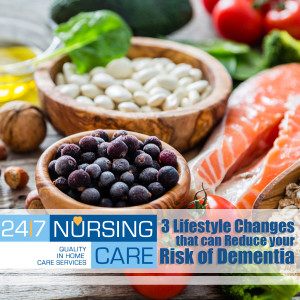3 Lifestyle Changes that can Reduce your Risk of Dementia
According to a new study published by the New England Journal of Medicine, the risk of developing dementia for those with at least high school degree is declining. This suggests that lifestyle changes and improving one’s physical health can actually help prevent or at least delay cognitive decline. You can make these three important lifestyle changes today to help prevent dementia.
- Eat healthy, think “Mediterranean diet”
You may think to yourself, “sure, I eat healthy, I take a handful of supplements and vitamins daily!” While the benefits of supplements cannot be denied, they cannot substitute for the benefits that healthy, vitamin-rich food provides. For example, even though you might take a vitamin c supplement daily, doesn’t mean you should stop eating oranges, since oranges provide all sorts of immune-boosting qualities that a supplement on its own cannot provide.
Some believe that the Mediterranean diet could actually have a greater effect on reducing the risk of Alzheimer’s than existing Alzheimer’s drugs. This diet includes “superfoods” like leafy greens, whole grains, fish, berries, and legumes. Olive oil is another potent superfood that does wonders for the brain. German scientists actually used the qualities of olives in an Alzheimer’s drug due to its high levels of antioxidants which help slow disease.
- Work out your brain
The term “use it or lose it” applies not only to physical strength, but also to the brain and memory. It’s a fact that memory stays sharper when people keep their brains active. Activities like continuing education, social engagement, doing crossword puzzles, playing a musical instrument, and learning a second language all help strengthen connections in brain cells. The American Society on Aging says that having meaningful experiences with kids also increases the psychological well-being of seniors. People that have engaging interactions with kids have been shown to burn 20% more calories per week, have fewer falls, and perform better on memory tests than their peers.
- Get up and get moving
While many of us do not consider ourselves to be fitness fanatics, that doesn’t mean we shouldn’t get regular physical exercise. The truth is, many of us are sedentary most of the day. But the many health benefits of getting up and moving just a little more throughout the day has been proven time and again. In a study conducted by the British Journal of Sports Medicine, regular aerobic exercise increased the size of the hippocampus, the area of the brain which controls memory and learning.
As with most habits, it’s good to start small. Park the car a little further than you normally would from the grocery store. Take the stairs, instead of the elevator to go up those two or three flights of stairs. Go on a walk with a friend. Incorporating a little physical activity into your day will shine through in your mental, physical, and even social health (all of which are important aspects of your health shown to decrease your risk of dementia).
If you have a family member or loved one with Alzheimer’s, you don’t have to bear the burden alone. 24-7 Nursing Care specializes in home care for seniors with Alzheimer’s and other dementias. Our highly qualified and trained staff are here to give your loved one the quality care they deserve.
References
Boost your memory by eating right – Harvard Health. (2012, August 1). Retrieved April 26, 2016, from http://www.health.harvard.edu/mind-and-mood/boost-your-memory-by-eating-right
Belluck, P. (2016, February 10). The New York Times. Retrieved April 26, 2016, from http://mobile.nytimes.com/2016/02/11/health/education-may-cut-dementia-risk-study-finds.html?_r=2
Altman, R. R. (2016, March 30). 3 Ways to Change Your Lifestyle and Reduce Your Risk of Alzheimer’s. Retrieved April 26, 2016, from http://www.huffingtonpost.com/rita-altman-rn/3-ways-to-change-your-lifestyle-and-reduce-your-risk-of-alzheimers_b_9562366.html




